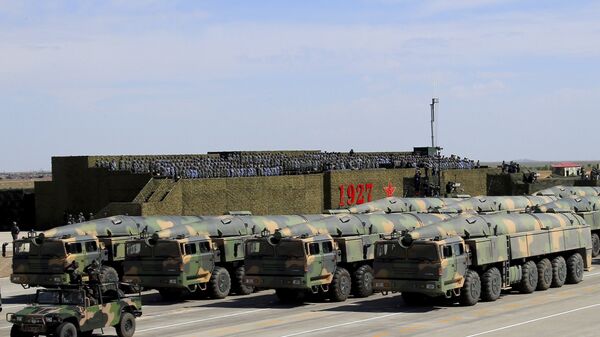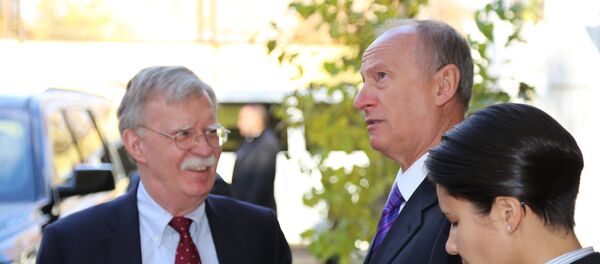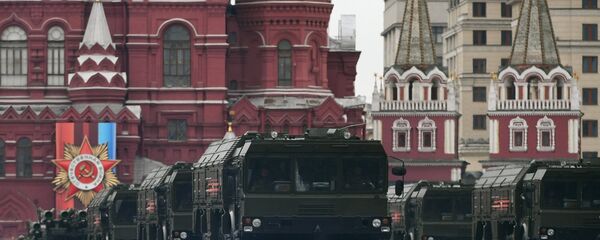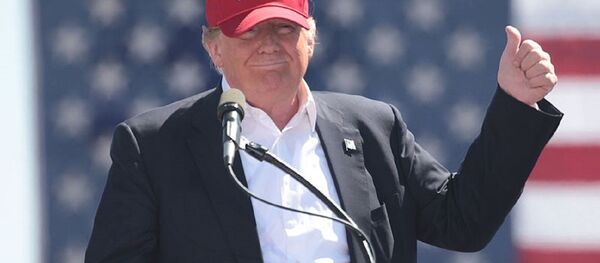Donald Trump's statement about the US's possible pullout from the Intermediate-Range Nuclear Forces (INF) Treaty is targeting China in the first place, said Yang Danzhi, the assistant director the Chinese Social Sciences Academy's Regional Security Center.
"The INF Treaty was at one time a limiter and barrier to the arms race between the United States and the Soviet Union, Russia's predecessor," Yang told Sputnik China. "The United States' unilateral withdrawal [from the agreement] means that they will not be controlled by anyone in this sphere and will make arbitrary decisions. The reason why the United States often 'backpedals' is that it cannot control its strategic competitors at its sole discretion — it is not allowed to do this by international mechanisms and agreements."
The question then arises as to why Washington links China to the INF Treaty issue.
Konstantin Sivkov, Russian Army reserve captain 1st rank and member of the Russian Academy of Missile and Ammunition Sciences, called Donald Trump's attempt to tie up the Chinese alleged missile threat with Washington's intention to leave the INF Treaty "utter nonsense."
"What does China have to do with the Russia-US INF Treaty? Nothing. China has long been creating medium-range missiles. Medium-range missiles are the basis of the Chinese strategic nuclear forces. But [Trump's] reasoning that the United States is withdrawing from the treaty because of China's deployment of its medium-range missiles is utter nonsense," Sivkov underscored.
According to the military analyst, this stance is nothing but a "blatant excuse" and sheer "provocation."
"The Chinese missile program is not related to the INF problem," he said. "China has always had medium-range missiles, because it did not enter into a bilateral treaty with the United States on medium and shorter-range missiles, as well as India, Pakistan and Israel, that, by the way, has a lot of warheads for such missiles, 200-400 warheads, according to various estimates. Therefore, the US' speculations about Chinese missiles are just an excuse."
"We may witness the deployment of these [military] systems in Taiwan, as well as at US military bases in the region," Korotchenko presumed. "From there, they would be able to keep China in the crosshairs. And this would become a new destabilizing outcome of the arms race launched by the US."
According to the military expert, this situation could significantly increase security risks for China. However, he believes that Beijing will find the way out and at least respond to US efforts: "China will not allow the United States to put it in the crosshairs of American missiles," Korothchenko stressed. "Accordingly, adequate countermeasures will be taken [by Beijing]."
On October 20, Donald Trump said that he would withdraw from the INF Treaty, stressing that the US should develop medium-range missiles. He also claimed that Russia was violating the bilateral deal.
In response, Russian Foreign Minister Sergei Lavrov said that this decision would be opposed by Moscow, specifying that Washington had not launched the procedure for withdrawing from the deal so far.
The US-Russian spat over the INF Treaty started under the Obama administration, however, Trump's predecessor decided to abide by the agreement, concluded between the US and the USSR in 1987.
Referring to Trump's statement, Chinese Foreign Ministry spokeswoman Hua Chunying emphasized the role of the agreement.
"The INF Treaty is an important arms control agreement reached by the US and the USSR during the Cold War. This agreement has played an important role in stabilizing international relations, maintaining global strategic balance and stability. Today it is still extremely important," Hua stated at a press briefing on October 22.
The views of the contributors do not necessarily reflect those of Sputnik.





